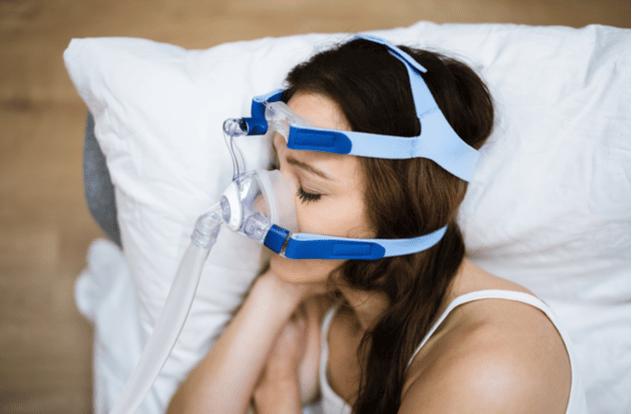Can Sleep Apnea Affect Your Respiratory Health?

Sleep apnea is a common sleep disorder that affects millions of individuals worldwide. It is characterized by repeated pauses in breathing during sleep, which can lead to fragmented sleep patterns and a range of health complications. While sleep apnea is primarily known for its impact on sleep quality, it can also have significant consequences for respiratory health.
This article explores the relationship between sleep apnea and respiratory health, examining the potential effects and consequences of untreated sleep apnea on the respiratory system. Additionally, it discusses the importance of seeking medical help for sleep apnea, as well as the available diagnosis and treatment options.
Lastly, it provides insights into managing and preventing sleep apnea, along with support and resources available for individuals living with this condition. By understanding the impact of sleep apnea on respiratory health, individuals can take proactive steps to maintain their overall well-being.
Key Takeaways
- Sleep apnea can have significant consequences for respiratory health, including decreased lung function, increased airway resistance, elevated inflammatory markers, and increased risk of respiratory infections.
- Timely diagnosis and treatment of sleep apnea are crucial in order to improve respiratory health and reduce complications.
- Continuous positive airway pressure (CPAP) therapy is the most common and effective treatment for sleep apnea, but other treatment options, such as lifestyle modifications and surgical interventions, may also be considered.
- Support groups and online communities can provide a platform for individuals with sleep apnea to connect, share experiences, and receive emotional support, which can enhance their respiratory health and overall well-being.
Understanding Sleep Apnea
Sleep apnea is a common sleep disorder characterized by repeated interruptions in breathing during sleep, which can have significant implications for an individual’s respiratory health.
It is estimated that approximately 22 million Americans suffer from this condition.
Sleep apnea is primarily categorized into three types: obstructive sleep apnea (OSA), central sleep apnea (CSA), and complex sleep apnea syndrome (CSAS).
OSA is the most prevalent form and occurs when the muscles in the throat fail to keep the airway open. This results in frequent pauses in breathing, leading to decreased oxygen levels and increased carbon dioxide levels in the body.
Over time, these disruptions can cause various respiratory problems, including chronic obstructive pulmonary disease (COPD), asthma exacerbations, and pulmonary hypertension.
It is crucial to diagnose and treat sleep apnea promptly to mitigate its potential adverse effects on respiratory health.
The Impact on Respiratory Health
Furthermore, the detrimental consequences of sleep apnea on the proper functioning of the respiratory system cannot be overlooked. Sleep apnea is a condition characterized by repeated pauses in breathing during sleep, leading to a decrease in oxygen levels and an increase in carbon dioxide levels in the body. These repetitive episodes of oxygen deprivation, known as hypoxemia, can have a significant impact on respiratory health. Studies have shown that sleep apnea is associated with various respiratory disorders, including chronic obstructive pulmonary disease (COPD), asthma, and respiratory infections. Additionally, the physiological changes caused by sleep apnea, such as increased upper airway resistance and inflammation, can further exacerbate respiratory issues. To illustrate the effects of sleep apnea on respiratory health, the following table provides a comparison between individuals with sleep apnea and those without in terms of respiratory parameters.
| Respiratory Parameters | Individuals with Sleep Apnea | Individuals without Sleep Apnea |
|---|---|---|
| Lung Function | Decreased | Normal |
| Airway Resistance | Increased | Normal |
| Inflammatory Markers | Elevated | Normal |
| Risk of Respiratory Infections | Higher | Lower |
| Oxygen Saturation | Decreased | Normal |
By examining these parameters, it becomes evident that sleep apnea has a profound impact on respiratory health, compromising lung function, increasing airway resistance, and elevating inflammatory markers. This highlights the importance of early diagnosis and management of sleep apnea to mitigate its adverse effects on the respiratory system.
Potential Consequences of Untreated Sleep Apnea
Neglecting to address sleep apnea can lead to a range of potential health consequences that may significantly impact overall well-being. Untreated sleep apnea can have serious implications for respiratory health. The intermittent cessation of breathing during sleep places strain on the respiratory system, leading to various complications. These potential consequences include:
- Increased risk of respiratory infections: Sleep apnea can weaken the immune system, making individuals more susceptible to respiratory infections such as pneumonia and bronchitis.
- Worsening of existing respiratory conditions: Sleep apnea can exacerbate pre-existing respiratory conditions, such as asthma or chronic obstructive pulmonary disease (COPD).
- Pulmonary hypertension: The repeated interruptions in breathing can cause high blood pressure in the lungs, leading to pulmonary hypertension.
- Decreased lung function: Sleep apnea can contribute to a decline in lung function over time, adversely affecting respiratory health.
Addressing sleep apnea through proper diagnosis and treatment is crucial in preventing these potential consequences and maintaining optimal respiratory health.
Diagnosis and Treatment Options
Proper diagnosis and treatment of sleep apnea are crucial in preventing potential complications and maintaining optimal respiratory well-being.
Diagnosis of sleep apnea typically involves a comprehensive evaluation, which may include a physical examination, medical history assessment, and sleep studies. Polysomnography, the gold standard for diagnosing sleep apnea, involves monitoring various physiological parameters during sleep, such as airflow, oxygen levels, and brain activity.
Once diagnosed, treatment options for sleep apnea aim to alleviate symptoms and improve respiratory health. Continuous positive airway pressure (CPAP) therapy is the most common and effective treatment, which involves wearing a mask that delivers a constant flow of air to keep the airways open during sleep.
Other treatment options include lifestyle modifications, such as weight loss and avoiding alcohol and sedatives, as well as surgical interventions in severe cases.
Timely diagnosis and appropriate treatment can significantly improve respiratory health and reduce the risk of associated complications.
Importance of Seeking Medical Help
Seeking medical assistance for sleep apnea is crucial in order to ensure timely and appropriate management of the condition and prevent potential complications. Sleep apnea is a serious disorder that can have significant impacts on respiratory health. It is characterized by repetitive pauses in breathing during sleep, leading to a decrease in oxygen levels and an increase in carbon dioxide levels in the body. Without proper medical intervention, sleep apnea can lead to a range of respiratory problems. These include increased risk of developing respiratory infections, exacerbation of existing respiratory conditions such as asthma or chronic obstructive pulmonary disease (COPD), impaired lung function and decreased oxygen saturation, and development of pulmonary hypertension, a condition characterized by high blood pressure in the arteries of the lungs.
Therefore, seeking medical help is vital to receive appropriate treatment options such as continuous positive airway pressure (CPAP) therapy, lifestyle modifications, or surgical interventions. These interventions can effectively manage sleep apnea and improve respiratory health.
Managing and Preventing Sleep Apnea
Implementing effective management strategies and adopting preventive measures can significantly enhance the overall well-being and quality of life for individuals with sleep apnea.
One key management strategy is continuous positive airway pressure (CPAP) therapy, which involves wearing a mask that delivers pressurized air to keep the airway open during sleep. This therapy has been shown to improve symptoms and reduce the occurrence of apnea episodes.
Other management options include lifestyle changes such as weight loss, regular exercise, and avoiding alcohol and sedatives, as these can worsen sleep apnea symptoms.
Additionally, positional therapy, which involves sleeping in a specific position that promotes better airflow, can be helpful for some individuals.
It is also crucial to address any underlying health conditions, such as allergies or nasal congestion, that may contribute to sleep apnea.
By implementing these management strategies and preventive measures, individuals with sleep apnea can experience better respiratory health and overall well-being.
Support and Resources for Individuals with Sleep Apnea
This discussion focuses on the support and resources available for individuals with sleep apnea, specifically support groups and online communities, as well as educational materials and websites.
Support groups and online communities provide individuals with a platform to connect with others who are experiencing similar challenges and share experiences, advice, and emotional support.
Educational materials and websites offer valuable information and resources to help individuals better understand sleep apnea, its management, and treatment options, empowering them to make informed decisions about their health.
Support Groups and Online Communities
Support groups and online communities can provide valuable resources and a sense of community for individuals affected by sleep apnea, fostering knowledge exchange and emotional support. These groups often consist of individuals who have firsthand experience with sleep apnea, allowing for a unique environment where individuals can share their own experiences, tips, and coping strategies.
Through these platforms, individuals can gain access to a wealth of information, such as the latest research, treatment options, and lifestyle changes that can improve their respiratory health. Furthermore, these communities offer emotional support, as individuals can connect with others who understand the challenges and frustrations associated with sleep apnea.
Online forums and support groups can be particularly beneficial for individuals who may not have access to local resources and can provide a safe space for open discussions and mutual encouragement.
Overall, support groups and online communities play a vital role in enhancing the respiratory health and well-being of individuals with sleep apnea.
Educational Materials and Websites
Support groups and online communities can provide valuable emotional support and a sense of belonging for individuals with sleep apnea. However, it is also important to seek out educational materials and reliable websites to gain a deeper understanding of the condition and its impact on respiratory health.
Educational materials and websites serve as valuable resources for individuals seeking information about sleep apnea and its effects on respiratory health. These materials often provide comprehensive and up-to-date information on the causes, symptoms, diagnosis, and treatment options for sleep apnea. They may also offer insights into the potential complications and long-term consequences of untreated sleep apnea.
To make the learning process more enjoyable and relatable, many educational materials and websites incorporate an unordered bullet list format. This format allows for easy scanning and quick access to key points.
Some common topics covered in these bullet lists include:
- Common risk factors for sleep apnea
- Lifestyle modifications to improve respiratory health
- Available treatment options and their efficacy
- Tips for managing symptoms and improving sleep quality
By exploring these educational materials and websites, individuals with sleep apnea can gain a better understanding of their condition and make informed decisions about their respiratory health.
Frequently Asked Questions
Can sleep apnea be cured completely?
Sleep apnea cannot be completely cured, but it can be effectively managed. Treatment options include lifestyle changes, continuous positive airway pressure (CPAP) therapy, oral appliances, and surgery, depending on the severity and underlying causes of the condition.
How does sleep apnea affect cognitive function?
Sleep apnea can negatively impact cognitive function. It is associated with decreased attention, memory problems, and impaired executive function. The intermittent oxygen deprivation and fragmented sleep patterns contribute to these cognitive deficits.
Are there any alternative treatments for sleep apnea?
Alternative treatments for sleep apnea include continuous positive airway pressure (CPAP), oral appliances, positional therapy, and surgery. These interventions aim to improve breathing during sleep and alleviate symptoms such as snoring and daytime sleepiness.
What are the long-term effects of untreated sleep apnea?
Untreated sleep apnea can lead to serious long-term consequences. It has been associated with an increased risk of cardiovascular diseases, hypertension, stroke, diabetes, cognitive impairment, and even mortality. Prompt diagnosis and treatment are crucial to prevent these detrimental effects.
Can children develop sleep apnea?
Children can develop sleep apnea, a condition characterized by pauses in breathing during sleep. Sleep apnea in children can have various causes, such as enlarged tonsils or obesity. It is important to diagnose and treat sleep apnea in children to prevent potential respiratory health issues.











